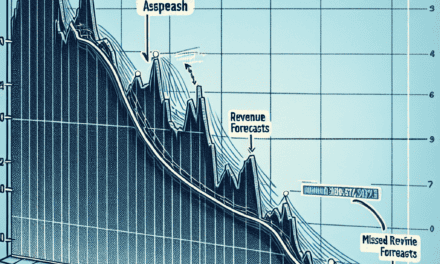“Markets Brace as Bond Vigilantes Rally: Yields Soar on Trump Victory Horizon”
Introduction
In the wake of a potential electoral victory for Donald Trump, financial markets are experiencing significant turbulence, with bond vigilantes reacting swiftly to the shifting political landscape. As the prospect of a Trump presidency becomes increasingly likely, yields on government bonds have surged, reflecting investor concerns over potential fiscal policies and economic implications. This reaction underscores the market’s sensitivity to political developments and the anticipated impact on inflation, interest rates, and government borrowing. The bond market’s response highlights the critical role of bond vigilantes—investors who actively sell bonds in response to fiscal policies they perceive as inflationary or fiscally irresponsible—in shaping economic expectations and influencing government policy. As yields rise, the financial community braces for the potential economic shifts that a Trump administration might herald, with implications for both domestic and global markets.
Impact Of Trump’s Imminent Victory On Global Bond Markets
As the political landscape in the United States shifts dramatically with the imminent victory of Donald Trump, global bond markets are experiencing significant turbulence. The term “bond vigilantes” has resurfaced in financial discussions, referring to investors who sell bonds in response to fiscal policies they perceive as inflationary or fiscally irresponsible. This phenomenon is becoming increasingly evident as bond yields surge, reflecting the market’s reaction to the anticipated policy changes under a Trump administration.
The bond market, often seen as a barometer of economic sentiment, is reacting to the potential for increased government spending and tax cuts promised by Trump. These policies, while aimed at stimulating economic growth, raise concerns about rising inflation and expanding budget deficits. Consequently, bond investors are demanding higher yields to compensate for the anticipated increase in inflation and the risk of holding government debt. This shift in investor sentiment is causing a sell-off in bonds, leading to a rise in yields.
Moreover, the impact of Trump’s victory is not confined to the United States alone. Global bond markets are interconnected, and the ripple effects are being felt worldwide. In Europe, for instance, bond yields are also on the rise as investors reassess their portfolios in light of the changing U.S. economic outlook. The European Central Bank, which has been grappling with low inflation and sluggish growth, now faces additional challenges as higher yields could complicate its monetary policy efforts.
In Asia, the reaction is similarly pronounced. Japanese government bonds, which have long been a safe haven for investors, are experiencing increased volatility. The Bank of Japan’s yield curve control policy is being tested as global yield movements exert upward pressure on Japanese yields. This situation underscores the delicate balance central banks must maintain in navigating the complex interplay between domestic economic conditions and global market forces.
Transitioning to the broader implications, the surge in bond yields has significant consequences for various sectors of the economy. Higher yields translate into increased borrowing costs for governments, corporations, and consumers. This could potentially dampen economic growth if businesses and individuals curtail spending and investment in response to rising interest rates. Additionally, the housing market, which is sensitive to changes in interest rates, may experience a slowdown as mortgage rates climb.
Furthermore, the equity markets are not immune to these developments. While some sectors may benefit from Trump’s proposed policies, such as infrastructure and defense, others may face headwinds due to higher financing costs and potential trade disruptions. Investors are closely monitoring these dynamics, leading to increased volatility in stock markets worldwide.
In conclusion, the imminent victory of Donald Trump is having a profound impact on global bond markets, as evidenced by the actions of bond vigilantes and the resulting surge in yields. The interconnectedness of global financial markets means that these developments are being felt far beyond U.S. borders, affecting economic conditions and policy decisions worldwide. As investors and policymakers navigate this new landscape, the focus will remain on balancing growth objectives with the risks of inflation and fiscal sustainability. The coming months will be crucial in determining how these forces play out and shape the future of the global economy.
Bond Vigilantes: Guardians Of Fiscal Discipline Or Market Disruptors?
As the political landscape shifts with the potential victory of Donald Trump, bond vigilantes are once again making their presence felt in the financial markets. These market participants, often seen as the guardians of fiscal discipline, are reacting to the prospect of a Trump administration by driving bond yields higher. This surge in yields reflects their concerns over potential fiscal policies that could lead to increased government borrowing and inflationary pressures. Consequently, the actions of bond vigilantes are sparking a debate about their role in the financial ecosystem—are they protectors of economic stability or disruptors of market equilibrium?
To understand the current reaction, it is essential to delve into the concept of bond vigilantes. These investors, typically large institutional players, exert influence over government fiscal policies by selling off bonds when they perceive fiscal irresponsibility. This sell-off leads to higher yields, effectively increasing the cost of borrowing for governments. In this context, the bond market acts as a check on fiscal policy, ensuring that governments do not engage in excessive spending that could destabilize the economy. However, this influence is a double-edged sword. While it can promote fiscal discipline, it can also lead to market volatility and increased borrowing costs, which can have adverse effects on economic growth.
The anticipation of a Trump victory has reignited the bond vigilantes’ concerns, primarily due to his proposed economic policies. Trump’s agenda, which includes significant tax cuts and increased infrastructure spending, suggests a potential rise in the federal deficit. Bond vigilantes, wary of the inflationary impact of such policies, are reacting by demanding higher yields. This reaction underscores their role as fiscal watchdogs, signaling to policymakers the need for caution in fiscal management. However, it also raises questions about the timing and impact of their actions, particularly in a period of economic recovery.
Moreover, the bond vigilantes’ response highlights the delicate balance between fiscal policy and market expectations. While their actions can serve as a warning against fiscal profligacy, they can also exacerbate economic challenges by increasing borrowing costs. This is particularly pertinent in the current environment, where central banks are striving to maintain low interest rates to support economic growth. The surge in yields, driven by bond vigilantes, could counteract these efforts, complicating the path to economic stability.
In addition, the reaction of bond vigilantes to a potential Trump presidency reflects broader market sentiments and uncertainties. Investors are not only concerned about fiscal policies but also about geopolitical risks and trade tensions that could arise under a Trump administration. These factors contribute to the volatility in bond markets, as investors reassess their risk exposure and adjust their portfolios accordingly. The interplay between these elements underscores the complexity of the financial markets and the multifaceted role of bond vigilantes within them.
In conclusion, the actions of bond vigilantes in response to the prospect of a Trump victory illustrate their significant influence on fiscal policy and market dynamics. While they serve as a check on government spending, their impact on market stability and economic growth remains a subject of debate. As the political and economic landscape continues to evolve, the role of bond vigilantes will undoubtedly remain a critical factor in shaping fiscal policy and market outcomes. Their actions, whether viewed as guardians of fiscal discipline or market disruptors, will continue to be closely scrutinized by policymakers and investors alike.
The Role Of Bond Yields In Political Uncertainty
In the wake of political uncertainty, particularly during election periods, financial markets often exhibit heightened volatility. This phenomenon is especially pronounced in the bond market, where yields can fluctuate significantly in response to political developments. The recent surge in bond yields, as the prospect of a Trump victory becomes increasingly likely, underscores the critical role that bond vigilantes play in shaping market dynamics during times of political upheaval.
Bond vigilantes, a term coined to describe investors who sell bonds in response to fiscal or monetary policies they perceive as inflationary or fiscally irresponsible, have once again made their presence felt. As the likelihood of a Trump victory looms, these market participants are reacting to the potential implications of his economic policies. Historically, Trump’s administration has been associated with tax cuts, deregulation, and increased government spending, all of which can lead to higher inflation and increased borrowing. Consequently, bond vigilantes, anticipating these outcomes, have begun to sell off bonds, driving yields upward.
The relationship between bond yields and political uncertainty is complex and multifaceted. Bond yields, which move inversely to bond prices, are a reflection of investor sentiment and expectations about future economic conditions. When political uncertainty arises, investors demand a higher yield as compensation for the increased risk, leading to a sell-off in bonds. This dynamic is particularly evident in the current scenario, where the potential for a Trump victory has introduced a new layer of uncertainty into the economic outlook.
Moreover, the surge in bond yields can have far-reaching implications for the broader economy. Higher yields translate into increased borrowing costs for both consumers and businesses, potentially dampening economic growth. For instance, rising yields can lead to higher mortgage rates, making it more expensive for individuals to purchase homes. Similarly, businesses may face higher costs when issuing debt, which could curtail investment and expansion plans. Thus, the actions of bond vigilantes, while rooted in market principles, can have tangible effects on economic activity.
In addition to domestic considerations, the reaction of bond vigilantes to political uncertainty can also have international ramifications. As U.S. bond yields rise, the relative attractiveness of U.S. assets increases, potentially leading to capital inflows from abroad. This can result in a stronger U.S. dollar, which, while beneficial for importers, can pose challenges for exporters by making American goods more expensive on the global market. Furthermore, higher U.S. yields can exert upward pressure on yields in other countries, as investors seek comparable returns, thereby influencing global financial conditions.
In conclusion, the recent surge in bond yields, driven by the anticipation of a Trump victory, highlights the pivotal role that bond vigilantes play in navigating political uncertainty. Their actions, rooted in expectations of future economic policies and conditions, can have significant implications for both domestic and international markets. As political landscapes continue to evolve, understanding the interplay between bond yields and political uncertainty remains crucial for investors, policymakers, and economists alike. This dynamic underscores the importance of monitoring bond market reactions as a barometer of investor sentiment and economic expectations in times of political change.
How Trump’s Economic Policies Influence Bond Vigilantes
As the political landscape shifts with the potential victory of Donald Trump, the financial markets are responding with notable volatility, particularly within the bond market. Bond vigilantes, a term used to describe investors who sell bonds in response to fiscal policies they perceive as inflationary or fiscally irresponsible, are reacting swiftly to the prospect of Trump’s economic policies. This reaction is manifesting in a surge in bond yields, reflecting the market’s anticipation of increased government borrowing and potential inflationary pressures.
The bond market’s sensitivity to fiscal policy is well-documented, and Trump’s proposed economic strategies are no exception. His plans, which include significant tax cuts, increased infrastructure spending, and a focus on deregulation, are designed to stimulate economic growth. However, these measures also raise concerns about the potential for increased budget deficits and national debt. Bond vigilantes, wary of these fiscal implications, are likely to demand higher yields as compensation for the perceived risk of inflation and fiscal instability.
Moreover, the anticipation of Trump’s policies has already begun to influence the Federal Reserve’s monetary policy stance. The central bank, which closely monitors inflation indicators, may be compelled to adjust interest rates more aggressively to counteract any inflationary pressures arising from expansive fiscal policies. This potential shift in monetary policy further contributes to the upward pressure on bond yields, as investors recalibrate their expectations for future interest rates.
In addition to domestic fiscal policies, Trump’s approach to international trade could also impact bond markets. His stance on renegotiating trade agreements and imposing tariffs may lead to trade tensions, which could disrupt global supply chains and impact economic growth. Such uncertainties can exacerbate market volatility, prompting bond vigilantes to reassess their positions and demand higher yields as a buffer against potential economic disruptions.
Furthermore, the bond market’s reaction is not solely driven by domestic factors. Global economic conditions, including the policies of other major economies and geopolitical developments, play a crucial role in shaping investor sentiment. In this interconnected financial landscape, any perceived instability or policy shifts in the United States can have ripple effects across global markets, influencing bond yields worldwide.
As bond vigilantes react to the prospect of a Trump victory, it is essential to consider the broader implications for the economy. Rising bond yields can lead to higher borrowing costs for both the government and private sector, potentially dampening investment and economic growth. This dynamic underscores the delicate balance policymakers must strike between stimulating the economy and maintaining fiscal discipline.
In conclusion, the bond market’s response to the potential victory of Donald Trump highlights the intricate relationship between fiscal policy and investor behavior. Bond vigilantes, acting as a check on government borrowing and spending, are signaling their concerns through rising yields. As the political and economic landscape continues to evolve, the actions of these market participants will remain a critical factor in shaping the trajectory of both the bond market and the broader economy. The interplay between fiscal policy, monetary policy, and global economic conditions will undoubtedly continue to influence the decisions of bond vigilantes, underscoring the complexity of navigating financial markets in an era of political change.
Historical Analysis: Bond Market Reactions To Political Shifts
In the annals of financial history, the bond market has often served as a barometer for political shifts, reacting swiftly to changes in the political landscape. The term “bond vigilantes” refers to investors who sell bonds in response to fiscal policies they perceive as inflationary or fiscally irresponsible, thereby driving up yields. This phenomenon was notably observed during the 1990s when bond investors reacted to U.S. fiscal policies. As the 2016 U.S. presidential election unfolded, the bond market once again found itself at the center of attention. With Donald Trump’s victory appearing imminent, bond vigilantes reacted with a marked increase in yields, reflecting their anticipation of significant policy shifts.
The bond market’s reaction to Trump’s potential presidency was rooted in his campaign promises, which included substantial tax cuts, increased infrastructure spending, and a more protectionist trade stance. These proposals suggested a departure from the fiscal conservatism that had characterized previous administrations, leading investors to anticipate higher inflation and increased government borrowing. Consequently, as the probability of a Trump victory grew, bond investors began to adjust their portfolios in anticipation of these changes. The result was a surge in bond yields, as prices fell in response to the expected increase in supply and inflationary pressures.
Historically, bond markets have been sensitive to political changes that signal shifts in fiscal and monetary policy. For instance, the election of Ronald Reagan in 1980 saw a similar reaction, as his economic policies, known as “Reaganomics,” promised tax cuts and increased defense spending. Bond yields rose in response to fears of rising deficits and inflation, although they eventually stabilized as the Federal Reserve took measures to control inflation. Similarly, the bond market’s reaction to Trump’s potential presidency was not merely a knee-jerk response but rather a calculated adjustment based on historical precedents and economic forecasts.
Moreover, the bond market’s response to political shifts is not limited to the United States. In the United Kingdom, the unexpected result of the Brexit referendum in 2016 led to significant volatility in bond markets, as investors grappled with the potential economic implications of the decision. The uncertainty surrounding Brexit negotiations and the future of the UK’s trade relationships prompted a flight to safety, with investors seeking refuge in government bonds, thereby driving yields down. This contrasts with the reaction to Trump’s potential victory, where the anticipation of expansionary fiscal policies led to an increase in yields.
In analyzing these historical reactions, it becomes evident that bond markets are highly attuned to the potential economic impacts of political decisions. The role of bond vigilantes underscores the importance of investor sentiment in shaping market dynamics. As policymakers navigate the complexities of governance, they must remain cognizant of the bond market’s capacity to influence economic conditions through its response to fiscal and monetary policies.
In conclusion, the bond market’s reaction to the prospect of a Trump presidency serves as a reminder of the intricate relationship between politics and financial markets. As history has shown, bond vigilantes play a crucial role in holding governments accountable for their fiscal policies, acting as a check on potential excesses. The surge in yields in response to Trump’s imminent victory was not an isolated incident but part of a broader historical pattern of market reactions to political shifts. As such, understanding these dynamics is essential for both policymakers and investors as they navigate the ever-evolving landscape of global finance.
Strategies For Investors Amid Surging Bond Yields
As the political landscape shifts with the apparent victory of Donald Trump, bond markets are experiencing a significant upheaval, prompting investors to reassess their strategies amid surging yields. The term “bond vigilantes” refers to investors who sell bonds in response to fiscal policies they perceive as inflationary or fiscally irresponsible, thereby driving up yields. This phenomenon is becoming increasingly relevant as Trump’s economic policies, characterized by tax cuts and increased infrastructure spending, are anticipated to lead to higher inflation and larger budget deficits. Consequently, bond vigilantes are reacting by selling off bonds, causing yields to rise sharply.
In this environment, investors are faced with the challenge of navigating a market where traditional fixed-income investments may no longer provide the stability and returns they once did. As yields rise, bond prices fall, leading to potential losses for those holding long-term bonds. Therefore, it is crucial for investors to consider strategies that can mitigate risks and capitalize on the changing dynamics of the bond market.
One potential strategy is to shorten the duration of bond portfolios. By investing in bonds with shorter maturities, investors can reduce their exposure to interest rate risk. Short-term bonds are less sensitive to changes in interest rates, and as yields rise, they can be reinvested at higher rates more quickly than long-term bonds. This approach allows investors to maintain some level of income while minimizing potential losses from declining bond prices.
Another strategy involves diversifying into inflation-protected securities, such as Treasury Inflation-Protected Securities (TIPS). These instruments are designed to protect investors from inflation by adjusting the principal value of the bond in line with changes in the Consumer Price Index (CPI). As inflation expectations rise, TIPS can offer a hedge against the eroding purchasing power of fixed-income investments, providing a more stable return in an inflationary environment.
Additionally, investors might consider reallocating a portion of their portfolios into equities, particularly those sectors that stand to benefit from Trump’s proposed policies. Infrastructure and defense stocks, for example, could see gains as government spending in these areas increases. While equities carry their own set of risks, they can offer growth potential that may offset the challenges faced in the bond market.
Furthermore, exploring alternative investments such as real estate or commodities could provide diversification benefits and potential inflation hedges. Real estate investments, particularly those with rental income, can offer a steady cash flow and appreciation potential. Commodities, on the other hand, often perform well during inflationary periods, as their prices tend to rise with increasing demand and limited supply.
In conclusion, as bond vigilantes react to the anticipated economic policies of a Trump administration, investors must adapt their strategies to manage the risks associated with surging bond yields. By shortening bond durations, incorporating inflation-protected securities, diversifying into equities, and exploring alternative investments, investors can position themselves to navigate the evolving market landscape. While the path forward may be uncertain, a proactive approach can help mitigate risks and uncover opportunities in this dynamic environment.
The Future Of U.S. Fiscal Policy Under Trump’s Leadership
As the political landscape in the United States undergoes a seismic shift with the apparent victory of Donald Trump, the financial markets are responding with notable volatility, particularly in the bond market. Bond vigilantes, a term used to describe investors who sell bonds in response to fiscal policies they perceive as inflationary or fiscally irresponsible, are making their presence felt. The surge in bond yields is a clear indication of their reaction to the anticipated changes in U.S. fiscal policy under Trump’s leadership. This development raises important questions about the future trajectory of fiscal policy and its implications for the broader economy.
The bond market’s response is rooted in expectations of Trump’s economic agenda, which is likely to include significant tax cuts, increased infrastructure spending, and a general shift towards more expansionary fiscal policies. These measures, while aimed at stimulating economic growth, are also expected to increase the federal deficit. Consequently, bond investors are concerned about the potential for rising inflation and higher interest rates, which would erode the value of existing bonds. As a result, they are demanding higher yields to compensate for the increased risk, leading to a sell-off in the bond market.
Moreover, the anticipated fiscal policies under Trump’s administration are likely to lead to a recalibration of the Federal Reserve’s monetary policy stance. With the prospect of higher inflation and stronger economic growth, the Fed may be compelled to raise interest rates more aggressively than previously planned. This potential shift in monetary policy further contributes to the upward pressure on bond yields, as investors adjust their expectations for future interest rate hikes.
In addition to domestic factors, the global economic environment also plays a crucial role in shaping the bond market’s reaction. The interconnectedness of global financial markets means that changes in U.S. fiscal policy can have far-reaching implications. For instance, higher U.S. bond yields could attract capital flows from other countries, leading to a strengthening of the U.S. dollar. While a stronger dollar may benefit American consumers by making imports cheaper, it could also pose challenges for U.S. exporters by making their goods less competitive abroad.
Furthermore, the reaction of bond vigilantes underscores the delicate balance that policymakers must strike between stimulating economic growth and maintaining fiscal discipline. While expansionary fiscal policies can provide a much-needed boost to the economy, especially in times of sluggish growth, they also carry the risk of exacerbating fiscal imbalances. This is particularly pertinent given the already high levels of public debt in the United States. Therefore, the challenge for Trump’s administration will be to implement policies that foster sustainable economic growth without undermining fiscal stability.
In conclusion, the surge in bond yields in response to Trump’s apparent victory reflects the market’s anticipation of significant changes in U.S. fiscal policy. As bond vigilantes react to the potential for increased inflation and higher interest rates, the implications for the broader economy are profound. The interplay between fiscal and monetary policy will be crucial in determining the future path of the U.S. economy. As such, policymakers will need to navigate these complex dynamics carefully to ensure that the benefits of economic growth are realized without compromising fiscal sustainability.
Q&A
1. **What are bond vigilantes?**
Bond vigilantes are investors who sell off bonds in response to fiscal policies they perceive as inflationary or fiscally irresponsible, leading to higher yields.
2. **Why would bond vigilantes react to a Trump victory?**
They might anticipate increased government spending and tax cuts, potentially leading to higher inflation and larger deficits, prompting them to sell bonds.
3. **What happens to bond yields when bond vigilantes sell off bonds?**
Bond yields rise as prices fall due to increased selling pressure.
4. **How does a Trump victory impact fiscal policy expectations?**
A Trump victory might lead to expectations of expansionary fiscal policies, such as infrastructure spending and tax reforms.
5. **Why do yields surge when bond vigilantes react?**
Yields surge because the selling of bonds increases supply in the market, driving down prices and pushing up yields.
6. **What are the potential economic implications of rising yields?**
Rising yields can increase borrowing costs for the government and private sector, potentially slowing economic growth.
7. **How might the Federal Reserve respond to a surge in yields?**
The Federal Reserve might adjust its monetary policy, potentially by altering interest rates or engaging in open market operations to stabilize the economy.
Conclusion
The article “Bond Vigilantes React as Trump Victory Appears Imminent, Yields Surge” likely discusses the financial market’s response to the potential election of Donald Trump as President. Bond vigilantes, investors who protest fiscal or monetary policies they consider inflationary by selling bonds, appear to be reacting to the anticipated policy changes under a Trump administration. The surge in yields suggests that investors expect increased government borrowing, potential inflation, or changes in fiscal policy that could lead to higher interest rates. This reaction reflects market uncertainty and the anticipation of significant shifts in economic policy, which could impact bond markets and broader financial conditions.





